
a photo history of british festivals
Festivals come in many sizes, across different settings and with a wide range of sounds. Since the 50's British youth culture has embraced the tradition of festivals with summer holidays being planned and scheduled around them. More than just some speakers in a field, they provide a place for radical organising and collective joy.
Text by Esta Maffrett | 15.07.2022
British culture has absorbed festivals into its identity. Through the green and pleasant lands, into urban cities up and down the country, first festivals have become a rite of passage for British youth. Each summer thousands descend on fields across the UK to listen to their favourite music, from the behemoths of Glastonbury and Download to the tiny festivals where you know everyone by the end of the weekend. The first was Isle of Wight in 1968 and set the scene for British festival-goers. DIY free festivals of the 60s and 70s brought an independent spirit fused with primordial festivities that culminated in Castlemorton Free Festival in 1994. Jazz, metal and electro all have their moment through the often damp summer months, tents are waved off down muddy streams and lifelong memories are made.
Festivals aren’t just about tents in a field though, and Britain has a long tradition of community-led festivals and street parties. In 1959 community leader Claudia Jones organised the London Caribbean Carnival at a local church following the Notting Hill Race Riots. In 1966 the first outdoor event was held and now the Notting Hill Carnival is Europe’s largest street party. From St Paul’s in Bristol to Moss Side in Manchester, Caribbean carnivals are a staple of the British summer. In 1988 the South Asian community in Nottingham organised the first Mela in the UK. It was a two day festival celebrating Asian music and culture which has led to Melas across the country.
On 1 July 1972, the Gay Liberation Front held the first London Pride, a march from Hyde Park to Trafalgar Square to celebrate LGBTQI+ identity and demand change. Rooted in protest and the fight for equality, it was and is an opportunity to stand tall in the face of adversity. Today the summer calendar is filled with Pride events across Britain, from large scale celebrations in Brighton and Manchester, to regional parties from Pride Cymru in Cardiff to Cumbria Pride, with more recent events catering for specific communities in the LGBTQI+ family such as UK Black Pride and London Trans+ Pride.
a timeline of festivals in britain
1956
1966
1968
1970
1972
1978
1988
Beaulieu Jazz Festival, one of the first outdoor festivals in the UK launched in 1956, hitting the headlines in 1960 when things get ‘out of hand’.
Notting Hill Carnival starts as an outdoor community festival, which came after the indoor ‘Caribbean Carnival’ at St Pancras Town Hall organised by Claudia Jones in 1959.
First Isle of Wight Festival, one of an original 3 editions, which kickstarted the large scale camping festival format.
The first edition of Glastonbury, then known as Pilton Festival, takes place on Worthy Farm. Tickets went for £1 a pop.
The Gay Liberation Front organises the first London Pride, attended by 2,000 people. It came a year after the members of their Youth Group organised the march around the age of consent.
The Rock Against Racism Carnival in Victoria Park made music political. Future carnivals were held across the UK, including the Rock Against Racism Northern Carnival later that year.
The first outdoor Mela in the UK was held in Nottingham, bringing together two days of Asian music and culture.



1989
1992
1998
2003
2020
Billed as the first outdoor rave up North and in the midst of the Second Summer of Love, Joy takes place at Ashworth Valley, Rochdale.
The week-long free festival Castlemorton Common Festival attracts 40,000 people and features sound systems including Bedlam, Circus Warp, Spiral Tribe and the DiY.
Legendary 90s Liverpool clubnight Cream launches their festival edition, Creamfields, which paved the way for modern festival culture.
The UK’s second biggest festival Download hosts its first edition, walking in the footsteps of Monsters of Rock which was held at the same location from 1980 to 1996.
The national covid lockdown results in the Summer festival season being cancelled, including music festivals, carnivals and Pride. Download is the first festival to take place post-lockdown in June 2021, as one of a series of test events to see if gatherings can resume safely.



